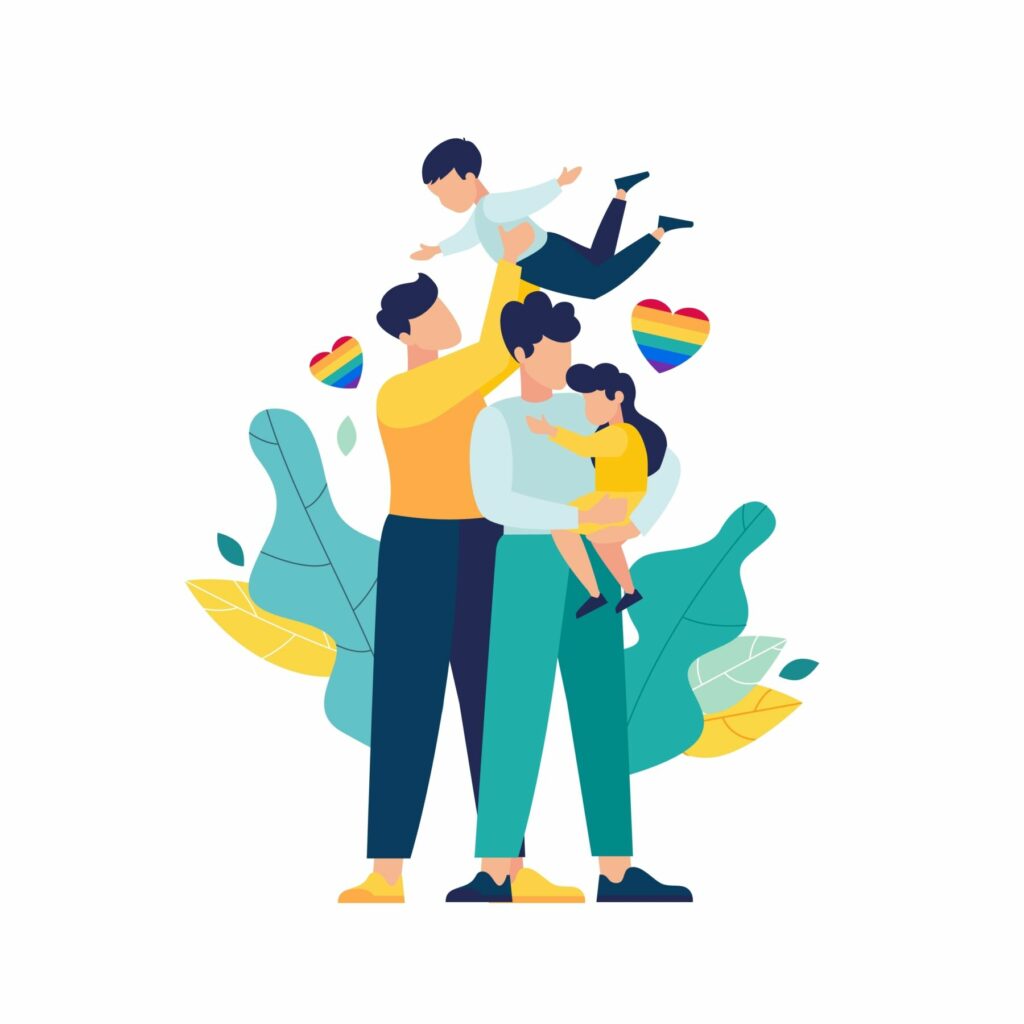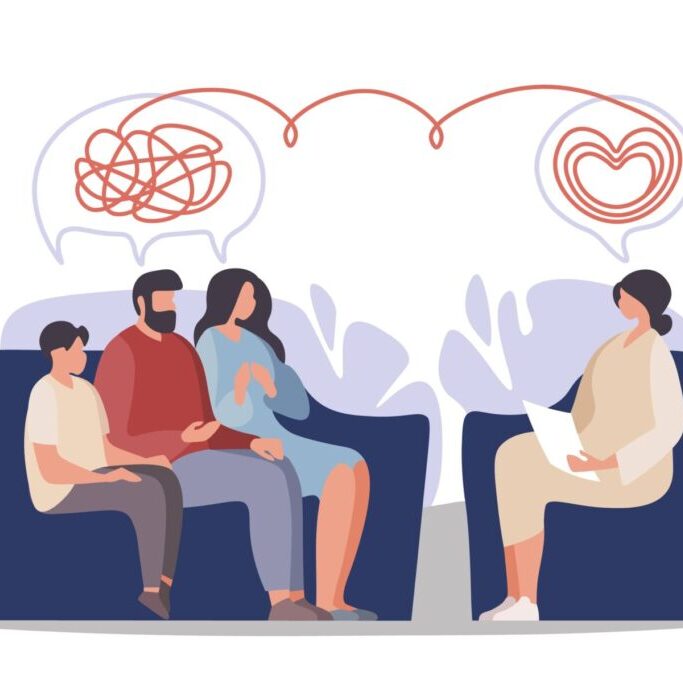Common LGBT Issues for Families

The modern concept of family has evolved beyond the traditional nuclear family structure of two dissimilar-gendered partners and 2.5 children. In many ways, what the typical American thinks of as the “traditional family structure,” has always been more fluid and has always included more nuance, family members, and family dynamics.
That being said, these families have not always had the privilege of seeing themselves represented in popular media, medical/mental health research, and conversations around parenting and household dynamics.
Now that we are expanding our ideas and acceptance around what a family can be and look like, we can recognize families who identify as queer and LGBT (Lesbian, Gay, Bisexual, Transgender) face unique challenges and opportunities related to their identities.
Let’s explore common issues that many queer and LGBT families encounter and the role of queer relationship therapy and LGBT family therapy in addressing these challenges.
Visibility and Acceptance
One of the most significant issues faced by LGBT families is the need for visibility and acceptance in society. While progress has been made in recent years, discrimination and prejudice still exist. Queer parents may encounter disapproval or misunderstanding from their extended families, communities, or even within their own households. This lack of acceptance can lead to feelings of isolation and stress.
On the other hand, the presence of an affirming LGBTQIA+ elder/caregiver can promote healthy self-exploration in children. Studies have shown that knowledgeable, affirming, and compassionate parents/caregivers significantly improve the mental health, well-being, and safety of LGBTQIA+ children.
One such study, “Family Acceptance in Adolescence and the Health of LGBT Young Adults published in the Journal of Child and Adolescent Psychiatric Nursing (Ryan, 2020), highlighted the critical role of family acceptance and its impact on the health and well-being of LGBTQIA+ young adults.
Ryan’s study found that adolescents who perceived higher levels of family support and acceptance were correlated with greater self-esteem, social support, and general health status, as well as reduced depression, substance abuse, and suicidal ideation and behaviors.
The study emphasizes the importance of family acceptance in fostering positive health outcomes and goes as far as suggesting that interventions aimed at increasing parental and caregiver acceptance can be beneficial for the mental health and well-being of queer and LGBTQIA+ youth.
LGBT family therapy can provide a safe and supportive space for families to address concerns they have, identify their specific family values, and work towards addressing any eternal biases that might come up within the system.
Therapists can help family members explore their feelings, educate them on LGBT issues, and facilitate open and respectful communication, ultimately promoting understanding and acceptance within the family unit.
Coming Out
Coming out, the process of revealing one’s sexual orientation or gender identity can be a critical moment and ongoing process for many queer and LGBT people. When parents come out to their children or when a child comes out to their parents, it can be emotionally challenging, liberating, confusing, celebratory, and everything in between.
LGBT family members may fear rejection, loss of support, or misunderstanding. Queer folx also often learn more about their gender expression and sexuality as they grow, mature, and become more comfortable with self-exploration. This can lead to the discovery of more affirming language and identity expression and the ability to communicate about these changes and transitions can help facilitate the wellbeing of the family system.
LGBT family therapy can assist families in navigating the ongoing coming-out process and help members become more comfortable discussing sometimes fraught topics like sexuality and self-expression. Therapists can guide individuals through effective communication, provide resources, and help family members understand, accept, and celebrate one another. This support can lead to stronger family bonds, improved overall well-being, and confidence in discussion and self-expression.
Discrimination and Bullying
LGBT children, in particular, may experience discrimination and bullying at school or in their communities. Russell and colleagues (2020) found significantly higher levels of bullying for queer students across other demographics when compared to their non-LGBT counterparts.
This mistreatment can have a significant impact on LGBT people’s mental and emotional well-being. For good reason, parents of LGBT children often worry about their safety and well-being and often need support in balancing their fears with the celebration, affirmation, and affection their child deserves. These experiences can also be incredibly triggering and upsetting for parents who have also experienced similar instances of discrimination and bullying.
LGBT family therapy can be a vital resource for addressing the emotional toll of discrimination and bullying and helping families with self-advocacy and exploring their options for addressing it. Therapists can offer guidance on how to support their children, build resilience, and advocate for safer environments. Additionally, therapy can help parents process their own fears and emotions related to their children’s experiences and some of the feelings that might come up around their own experiences.
Legal and Financial Issues
LGBT families may face legal and financial challenges that heterosexual families do not. Although Illinois is ahead of most other states in this regard, issues related to marriage, adoption, surrogacy, and inheritance can be more complex due to varying laws and regulations in different regions.
LGBT families may require legal and financial planning to protect their rights and their children’s interests. Because of these considerations, it’s important for LGBTQIA+ families to have a space that takes their particular circumstances into account.
LGBT family therapy can provide resources and support in navigating these legal and financial challenges. Therapists can connect families with legal professionals who specialize in LGBT family law and offer emotional support during these processes. Therapists should also be able to acknowledge, affirm, and validate families who are often facing undue and systemic barriers to the health and strength of their family system.
Identity and Self-Esteem
Identity development can be a complex journey for LGBT and queer people. They may grapple with self-acceptance, self-esteem, and self-identity. In some cases, they may experience internalized homophobia or transphobia, which can be emotionally taxing. On the other hand, the LGBTQIA+ experience can be one of validation, joy, and identity euphoria.
LGBT family therapy can be a valuable space for individuals to explore their identity and build self-esteem. Therapists can provide guidance and support as family members work through issues related to their sexual orientation or gender identity, ultimately fostering self-acceptance and self-confidence.
While it is important to work through the issues facing LGBTQIA+ families, it is also important that LGBTQIA+ families recognize the sense of joy, validation, and euphoria that can come along with a celebratory system. It is important for a therapist to encourage this.
Relationship Dynamics
Like any other families, queer, and LGBT families may encounter relationship challenges. Balancing work, family life, and personal needs can be complicated for all of us. Additionally, LGBT couples may face unique relationship issues, such as navigating open, non-monogamous relationships or dealing with external judgments around relational agreements. LGBTQIA+ families also have chosen family members who are important figures in their family system and need to be viewed as such.
LGBT family therapy can help couples and families address, normalize, and navigate their specific relationship dynamic(s). Therapists can teach communication skills, conflict resolution strategies, and provide a safe space for discussing individual and shared goals. This can lead to stronger and healthier relationships within the family. It can also be important to challenge and explore traditional gender roles that can still come up in LGBTQIA+ families.
Parenting and Child Development
LGBT parents are just as capable of providing loving and nurturing homes as heterosexual parents. However, they may face challenges related to explaining their family structure to their children and dealing with societal stereotypes. Often, queer families don’t have as many examples of affirming family structures or resources as cisgender and heterosexual parents do.
LGBT families can also encounter issues like school policies, peer interactions, and external judgments affecting their children’s development. (If you’re an educator, please hear our request to evaluate your policies and how they might negatively impact LGBT families.)
LGBT family therapy can provide parents with tools and strategies for addressing these challenges and identifying helpful and affirming resources. Therapists can help parents educate their children about their family structure, foster resilience, and advocate for supportive environments at school and in the community.
While LGBT families face a unique set of challenges in today’s world, they also have unique strengths and opportunities. LGBT family therapy plays a crucial role in addressing these challenges by providing a safe and supportive space for families to explore issues related to visibility, acceptance, coming out, discrimination, identity, relationships, parenting, and more.
By seeking professional help and fostering open and respectful communication, LGBT families can build stronger, healthier relationships and navigate the road to acceptance and well-being. As society continues to evolve, it is essential that we support and empower all families, regardless of their composition, in their pursuit of happiness and fulfillment.
This blog is made for informational and educational purposes only. It is not medical advice. The information in this blog is not intended to (1) replace a one-on-one relationship with a qualified licensed health care provider, (2) create or establish a provider-patient relationship, or (3) create a duty for us to follow up with you.



